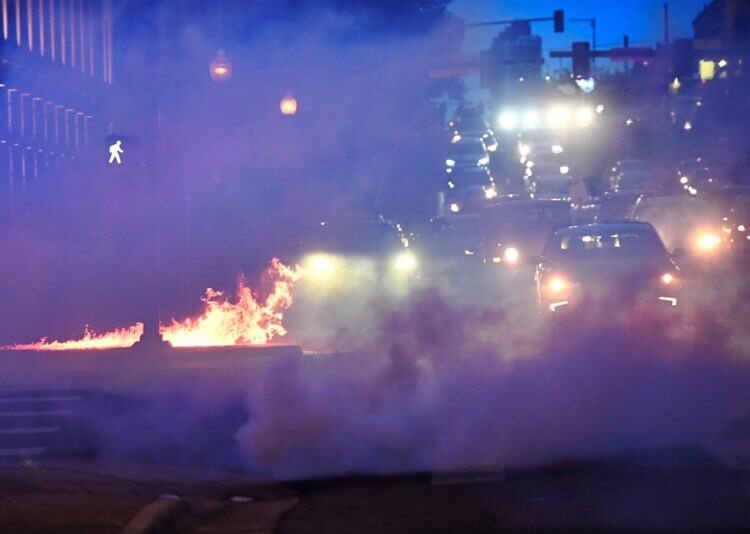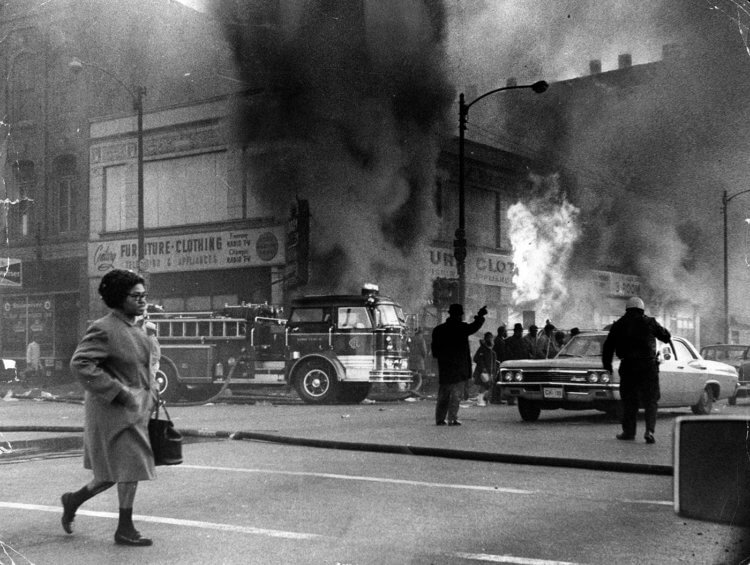Editor’s Note: This letter was sent by Colorado Academy Head of School Dr. Mike Davis to the CA community on Sunday, May 31, 2020.

City after city across the U.S. and overseas has erupted in protests over the past few days, including our own city of Denver, displaying the intense frustration of communities over yet another series of incidents in which African Americans are mistreated, brutally injured or murdered, each unarmed, each at the hands of white people, and nearly all through the actions of law enforcement. People in our community are hurting; students and adults have questions. This is an important time to provide ways for the Colorado Academy community to work together.
Some of the nighttime photographs (above, from The Denverite) are reminiscent of those from the 1968 Chicago riots (below) sparked in part by the assassination of Martin Luther King Jr. Some of the photographs are reminiscent of the 1992 riots in Los Angeles after a jury acquitted four LAPD officers of using excessive force in the brutal beating of Rodney King.
 What have we learned? What has changed? We have been bitterly divided as a nation many times before. But, somehow, this feels like a flashpoint, against the backdrop of a pandemic that highlights all too clearly that tragedy strikes harder for those in our communities who are mistreated, under-served, and marginalized. Could it be that this spiral will inch us ever closer as a nation to having a reckoning with our failures? How, in the wake of all of this, do we find our way forward?
What have we learned? What has changed? We have been bitterly divided as a nation many times before. But, somehow, this feels like a flashpoint, against the backdrop of a pandemic that highlights all too clearly that tragedy strikes harder for those in our communities who are mistreated, under-served, and marginalized. Could it be that this spiral will inch us ever closer as a nation to having a reckoning with our failures? How, in the wake of all of this, do we find our way forward?
In light of the protests, CA alumnus and Denver’s new Public Safety Director, Murphy Robinson (CA ’06) was quoted in the Denver Post saying, “To my fellow young people, I’m calling on you to help stop the violence….As we take over leadership in this country, we cannot repeat the mistakes of previous generations. Let us be the generation that comes together and removes the needles of bigotry and racism. We must have a nonviolent approach that includes partnership with civil activism.”
This will be a week of juxtaposition for our Colorado Academy community. On the one hand, we will be celebrating our Fifth and Eighth Graders as they continue to Middle and Upper school. Later in the week, we will be celebrating our Seniors for their accomplishments. Yet, in the background, we will continue to struggle with the pain of those feeling betrayed, with the escalating political tensions, and with the growing death toll from COVID-19. I hope that we can honor our students, but also honor our moral responsibility to be engaged citizens.
Education as a ‘weapon’
Part of the reason I work in education is because it is a meaningful and effective way to create positive change. In fact, it was Nelson Mandela who said, “Education is the most powerful weapon you can use the change the world.” As an American historian, I confront both the ideals and realities of American history. I actually think it is contrary to our values not to understand the good and the bad. I truly believe that this republic is a noble experiment. I also know that racism has been our collective crucible and the reason why we have failed too many of our people. The sins of the enslavement of African Americans and the near genocide of Native Americans shaped this nation’s history in undeniable ways. More than a half-million Americans died in the Civil War; yet even that did not bring us racial equality. Nor did the dismantling of Jim Crow segregation in the 1960s. While some things have changed, and progress has been upward, we have faltered. The continued killings by police of unarmed African American men is something that hits us collectively and raises real fears about the direction of our nation. The open displays of white supremacists carrying weapons and Confederate flags is another. And, we have our nation’s top leaders who stoke divisions, encourage violence, and fail to serve the diversity of people in this nation.
Nearly every civic leader in every major American city has tried to both honor the right to protest and the need to mourn with sadness and outrage over the killing of yet another black man. These civic leaders have also condemned the looting, vandalism, and violence, some of which is perpetuated not by people who are protesting in the name of George Floyd, but who are pursuing other agendas to divide and tear down this country. These anarchists offer no compelling vision of world order—their mantra is simply destruction.
The student voice
In times like this, I value the voices of our students. I teach classes on tough topics in American history. I love to hear what our students have to say and how they respond. For so many reasons, I wish in-person teaching was at hand and school was in session, so we could help students process what they are seeing and hearing. Part of the value of an educational community is that students from all different backgrounds can share how they are impacted by what they have seen and heard.
Within the past couple of days, a white male CA Senior reached out to Sarah Wright, CA’s Director of Inclusivity. Just as students should, he is thoughtfully searching for answers. With his permission, I want to share some of his email: “These recent events have been sobering to the soul, especially the murder of George Floyd. I am not an emotional person; yet watching that video aroused a righteous anger in me the likes of which I have never felt. Yet it also brought up confusion….In loving this country, am I embracing these racist ideologies and actions that are at play in these recent events? I wonder if it is wrong to love this nation when the actions of its citizens and officers have been so despicable?” And in reference to the violent protests, he asked, “Looking again to history, from the peaceful yet effective protests led by Martin Luther King Jr., it seems to me that staying calm and collected, keeping the moral high ground, will only embolden the cause against forces that try to do it harm. Yet some argue that this simply isn’t enough anymore. Are these riots really necessary to create the change we need…?
Non-white students also reached out—some with the very same questions. Sarah said, “They asked the same question, whether violence is the answer.” Just as she had done with the student above, Sarah talked with them about the many nonviolent forms of protest that can be employed for this same issue and the many ways that a democracy allows for the citizenry to impact the future.
The white student recognized the value in democratic elections and the value of a vote. “I invited him to change his question of, ‘Is voting enough?’ to ‘What can I do in addition to voting?’ In answer to his question about loving his country, even with its imperfections, Sarah said, “I shared that I know there are disparities in the education system, and yet, I still decided to become a teacher.”
We have different experiences
The first step in change comes in simply acknowledging a difference in experiences. While white students shared only positive experiences with local police, non-white students had very mixed experiences. Sarah said African American kids shared personal accounts of their parents having been followed by police, or of feeling nervous while walking from the CA bus stop to their house, as the only black family living in their housing development. Said the students, “Now the world is seeing what we’ve always experienced.”
African American students told Sarah that they don’t want to be worried about walking home from school, driving a car, running in the park, bird watching, or being mistreated because of the color of their skin. They said they also don’t want to fight for human rights in isolation.
With all students, Sarah shared the message that it’s okay to move in steps and phases, that it is why we are here, to use education to understand, and to use knowledge to inform action. Sarah has just finished her first year at Colorado Academy, and I have been so grateful for her work. In her role, she supports all of our students. These interactions are great examples of teaching. It’s all about asking questions and meeting people where they are. It’s about doing research and bringing in perspectives that you have never encountered. We don’t make progress by being judgmental or labeling. I am proud of all of our students for questioning and for looking for ways to help craft a better tomorrow.
Working together
My hope is that we can all heed the words of our CA alumnus Murphy Robinson about not repeating the mistakes of the past. And as we wish the Class of 2020 farewell, we send them out with the wish that they are, indeed, part of the “generation that comes together and removes the needles of bigotry and racism.”
We will be working on holding a number of Zoom community events for students, parents, and faculty to process what we are seeing in these trying times. We’ll provide additional information in the coming days. I hope you can join us and be part of the conversation.